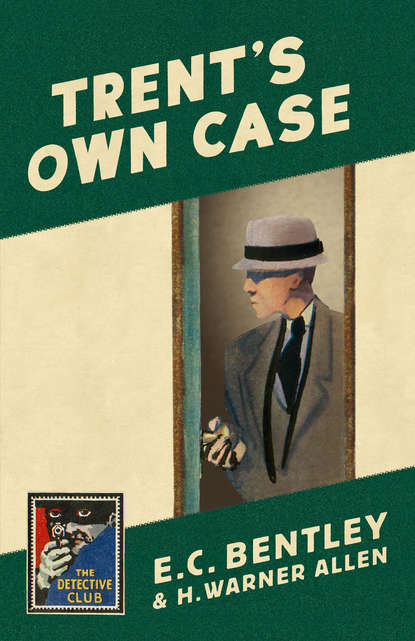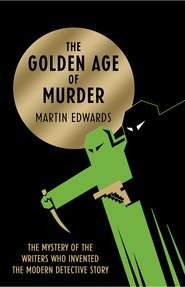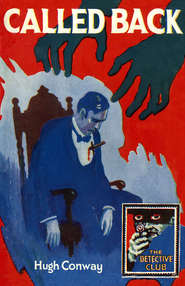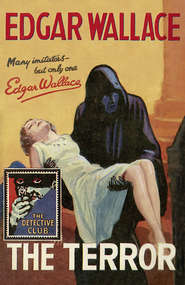По всем вопросам обращайтесь на: info@litportal.ru
(©) 2003-2024.
✖
Trent’s Own Case
Автор
Год написания книги
2019
Настройки чтения
Размер шрифта
Высота строк
Поля
Trent fell back in his chair, while Mr Bligh resumed his pipe and gazed dreamily at a corner of the ceiling.
‘That seems to have made you think a bit,’ he remarked after a moment, cannily observant of a slight frown on his guest’s usually untroubled countenance. ‘I shouldn’t wonder if you had been working up some valuable theory of your own about the case. If you have, let’s hear it. A good laugh’s the best tonic in the world. Come on! Am I right?’
‘Very often, I dare say,’ Trent said, with a swift return to his accustomed manner. ‘Not now. I never had the slightest notion of a theory about the case. I only heard of it three hours ago. But I do take an interest in it as I told you, and I thought, with my well-known helpfulness, that you might like to have a talk about it, and even let me have a look at the scene of the crime; but now, perhaps, everything being as you tell me, you’d rather not.’
Mr Bligh rubbed his chin. ‘I don’t know about that,’ he said slowly. Then, after a few moments’ consideration, he added: ‘It’s like this. The evidence is all there. I’ve told you, roughly, what it is. But there are some queer things about the case all the same, and we might as well have a yarn about it.’
‘Just what I should like. You know it’s safe to talk to me.’
‘If it wasn’t, my lad, you wouldn’t be here.’ A chuckle agitated the crumpled expanse of Mr Bligh’s waistcoat. ‘Well, you’ve seen what little there is in the papers, of course.’
‘Certainly; and it’s very little indeed. Can you tell me one thing, for instance, that they don’t mention—just how Randolph was shot?’
‘He was shot through the heart from behind, probably from the direction of the door of the bedroom, when he was just taking his coat off. It looks as if it was done by someone who had come to see him by appointment, and whom he had let in himself, the valet being out for the evening. The bullet was fired from a Webley .455, probably fitted with a silencer.’
‘Ah!’ Trent received this information with a thoughtful brow. ‘So that’s how it was. And you’re telling me that nobody knows this as yet but the police—and the surgeon, of course.’
‘Well, the man who murdered him knows it, I suppose,’ the inspector observed.
‘Yes, I’m capable of supposing that myself,’ Trent rejoined. ‘And now that we have arrived at that point, who did murder him?’
‘We haven’t arrived at that point.’ Mr Bligh, it was clear, was taking an innocent pleasure in saving up the climax of his tale. ‘Let’s take things in their order. First, there were the obvious possibilities to be thought of.’
‘The servants, you mean.’
‘You’ve read in the paper that there was only one, a manservant, sleeping in the place. He was out for the evening, and found the body when he came home; then informed the police by phone immediately. So he said.’
Trent nodded. ‘Raught—yes, I know him. And you put him through it, of course.’
‘I thought,’ the inspector said dubiously, ‘I had wrung him pretty dry; but one couldn’t be certain. Still, he’d got a reasonable enough story about having left the place just after you left it, to spend his evening off with some relations; and he hadn’t any motive that lay on the surface. He declared that when he found the body, he was in too much of a dither even to make out how Randolph had been killed. It might be true; but naturally I didn’t set him aside. The only other servant is a charlady, Mrs Barley, who kept the place in order when Randolph wasn’t staying there. I saw her too this morning—a simple soul, she is. I thought to myself, I miss my guess if she knows anything whatever about the crime—or about anything else worth mentioning. Then, as you know, I saw Verney, the secretary, who was always about the place when Randolph was in London; and he gave me a satisfactory account of his movements on the evening of the murder.’
‘Movements,’ Trent murmured. ‘An admirable word. Bend against Primrose Hill thy breast, dash down like torrent from its crest, with short and springing footstep pass the Marble Arch and Hamilton Place. Not a very good rhyme, that.’
‘The account he gave was rather more detailed,’ Mr Bligh said coldly. ‘After the run, which you appear to know about, he stayed at the Randolph Institute till ten thirty, and was in his rooms off Maida-vale five minutes later. All that’s been checked. As for motive, all he seems to have got by the crime is the loss of a good job.’
‘Like Raught—yes,’ Trent said. ‘And now, if I may ask a question—you know what weapon was used. You’ve got it, I suppose.’
‘Why should you suppose anything of the kind?’ the inspector retorted. ‘It’s not usual for murderers to leave the weapon lying about, is it?’
‘It’s not usual for them to confess,’ Trent pointed out; and Mr Bligh grunted morosely. ‘I only thought,’ Trent went on, ‘he might have led gently up to the confession, as it were, by not taking away the revolver.’
‘Well, we haven’t got it, that’s all,’ Mr Bligh snapped. ‘But we know what make it was, and what calibre, by looking at the bullet and the breech-markings on it—nothing easier, as it happens, with that type. As for where it is, all I can say is that it’s more likely than not to be lying somewhere on the floor of the Channel; but that’s nothing better than a guess.’
‘What I want to know,’ Trent persisted, ‘is why this Webley should be visiting the bottom of the monstrous world, since the murderer has confessed.’
The inspector rubbed his chin once more. ‘Well, of course, so do I. But come! We’re getting in advance of the story. If you do want to know what really happened, you must let me tell it my own way.’
He proceeded to give Trent a brief account of his investigation on the scene of the crime. He told of the empty safe; of the signs of documents having been stolen; of the fingerprints on the carafe and tumbler, and on the razor-blade found on the carpet; of the champagne cork; of the leaf missing from the engagement-block in the sitting-room.
Trent, who had listened in closely attentive silence, interposed at this point.
‘An engagement-block!’ he said. ‘And was that in a position where it could easily be seen?’
‘Anybody could see it. The cabinet it stood on was on top of the writing-table, just in front of the window. What about it?’
‘Only that I feel certain that it wasn’t there when I saw the old man in that room at six o’clock. I noticed that dwarf cabinet, too—it is a beautiful little thing.’
‘Hm! Yes.’ Mr Bligh again fingered his chin. ‘That does happen to be one of the funny points. Because Raught, the manservant, says positively that it never was left lying about, that Randolph was always most careful to keep it locked away. Still, of course, he may have had it out to refer to, some time before he was shot.’
‘So he may. And then, of course, the man who came to see him, and whose name was on the block as having an appointment with him, very cunningly tore off that leaf and took it away; thus destroying a piece of direct evidence that he had been there that evening.’
‘Yes.’
‘After which he rushed off and bunged in a confession of having been there, and having shot Randolph. Changeable sort of bloke!’
The inspector sighed wearily. ‘I know, I know. And Randolph may have torn off the leaf himself, for some reason. But look here! There’s one more thing I haven’t mentioned yet. When I saw it, it looked to me like a fatal blunder; and so it would have been, if the damfool hadn’t gone and—but never mind that just now, I am telling you things as they happened.’ He went on to describe the last of the morning’s finds, the luggage-label picked up in the hallway; and when he repeated the name written on the label, Trent made a movement of uncontrollable surprise.
‘Bryan Fairman!’ he exclaimed.
‘That’s what I said. He’s the man who did it,’ Mr Bligh added.
‘Do you mean to say he is the man whom you know to have been at Randolph’s place when he was shot, and who has confessed to the murder? Why, I know him!’
‘Is there anybody in this blasted case that you don’t know?’ the inspector asked plaintively. ‘Anyhow, if you know Bryan Fairman, you know a damned nuisance—him and his confession!’
‘I suppose you might call a murderer that,’ Trent admitted. ‘But really, Inspector, this is incredible. Fairman is one of my oldest friends. Do you remember when we were talking about Eunice Faviell some time ago, and the way so many men go crazy about her? I mentioned to you that a great friend of mine was one of those victims. I was speaking of this same Fairman. I have known him half my life, and of all the men that I should call sound citizens, he is about the most blameless. Why, I saw him only last night—’ and here Trent broke off, realizing suddenly the possible significance of that meeting.
The inspector’s eyelids narrowed. ‘Yes?’ he said gently.
‘He was catching the 8:20 at Victoria,’ Trent said slowly. ‘He very nearly missed it. And that’s the boat-train for Dieppe—I was seeing somebody off by it. But good Lord! Bryan Fairman! You know, it’s quite impossible to believe—’
‘Wait till you hear all there is to believe,’ Mr Bligh advised him. ‘There’s plenty. To begin with, “Passenger to Dieppe” was written on the label, as I was just going to tell you. Well, all that did for me was to give me someone to go after; which of course I did. If he was going to Dieppe by the night-boat, as seemed most likely, it was a thousand to one he was on his way to somewhere much further off, and had had a good many hours’ start on his journey, whatever it was—because the boat gets there in the small hours. But on the off-chance of Dieppe being his real destination, I had him looked for there; and sure enough I soon got news of him—and a lot of it. The first information was that Dr Bryan Fairman, complete with passport, had come by the boat and taken a room at the Hôtel Beau-Rivage. He left there about nine thirty this morning, after taking nothing but a cup of coffee. Then it came through that an Englishman carrying a kit-bag had been seen hanging about in a place called the Impasse de la Chimère, in the outskirts of the town, looking as if he had lost something. What on earth he can have wanted there the French police haven’t the least idea; they say they have made every possible inquiry—and they are pretty good at that, as you know—and they cannot imagine what he was after in that spot.’
‘That is remarkable, too,’ Trent said thoughtfully. ‘If the French police could not get any information they were looking for from local householders or concierges, it should mean that there wasn’t anything for them to get. And as for my friend Fairman being seen wandering about in the environs of Dieppe, it simply doesn’t make sense to me. He studied for a year at the Salpétrière in Paris, and as far as I know that is all the experience of France that he has. What else did you hear about him?’
‘In the same place,’ the inspector proceeded, ‘there is an inn, and Fairman had some more coffee there before he went away. The man who keeps the place says that the Englishman looked sick, and a bit dotty.’
‘Did he really say that?’ Trent inquired with keen interest.
‘His words were, as reported to us,’ replied the inspector, who numbered a practical, working knowledge of French among his professional merits, ‘that the man seemed to be “souffrant
Вы ознакомились с фрагментом книги.
Приобретайте полный текст книги у нашего партнера:
Приобретайте полный текст книги у нашего партнера:










